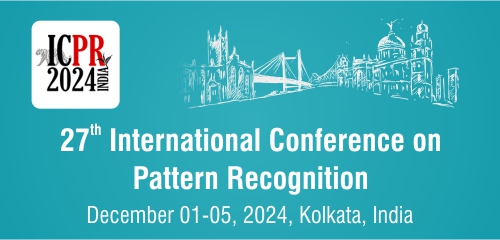| Instruction for Authors |
ICPR-2024 will follow a single-blind review process. Authors can include their names and affiliations in the manuscript.
Supplementary materials:
By the submission deadline, the authors may optionally submit additional material that was ready at the time of paper submission but could not be included due to constraints of format or space. The authors should refer to the contents of the supplementary material appropriately in the paper. Reviewers will be encouraged to look at it, but are not obligated to do so.
Supplementary material may include videos, proofs, additional figures or tables, more detailed analysis of experiments presented in the paper. There is no page limit for the supplementary materials but only one file with maximum file size of 50 MB is allowed for submission.
We encourage (if possible) authors to upload their code as part of their supplementary material in order to help reviewers assess the quality of the work.
Plagiarism: Plagiarism consists of appropriating the words or results of another, without credit. ICPR 2024's policy on plagiarism is to refer suspected cases to the Springer. We will be actively checking for plagiarism. Furthermore, the paper matching system is quite accurate. As a result, it regularly happens that a paper containing plagiarized material goes to a reviewer from whom material was plagiarized; experience shows that such reviewers pursue plagiarism cases enthusiastically.
Dual submissions: The goals of ICPR 2024 are to publish unpublished work and to avoid duplicating the effort of reviewers. By registering or submitting a manuscript to ICPR 2024, the authors acknowledge that it has not been previously published or accepted for publication in substantially similar form in any peer-reviewed venue including journal, conference or workshop. Furthermore, no publication substantially similar in content (defined as having 20 percent or more overlap) has been or will be registered or submitted to this or another conference, workshop, or journal during the review period. Violation of any of these conditions will lead to rejection, and will be reported to the other venue to which the submission was sent.
Attendance responsibilities: The authors agree that if the paper is accepted, at least one of the authors will register for the conference and present the paper.
Authors acting as reviewers: Given the growth of the number of paper submissions, and per the decision of the organizing committee of ICPR 2024, we expect all authors to be willing to serve as reviewers if asked to do so.
Privacy policy: IAPR may use the email ids of the authors for future communication. It can be shared with a third party managing such communications on behalf of IAPR or ICPR 2024. The details will not be shared for any commercial purpose.
Personal and human subjects data: If a paper makes use of personal data and/or data from human subjects, including personally identifiable information or offensive content, we expect that the collection and use of such data has been conducted carefully in accordance with the ethics guidelines. In many countries and institutions, the collection and use of personally identifiable data or data from human subjects is subject to approval from an Institutional Review Board (IRB, or equivalent). If the use of such data was approved by an IRB, stating this is sufficient. If the use of such data has not (yet) been approved by an IRB, authors should provide information on any pending approval process, how the data was obtained, as well as discuss if and how consent was obtained (or why it, perhaps, could not be obtained). This discussion can be included either in the main paper or in the supplementary material. If the authors use an existing, published dataset, we encourage (but do not require) them to check how data was collected and whether consent was obtained.
Reproducibility: Authors should put every effort possible to make the submission reproducible. We highly encourage authors to voluntarily submit their code as part of supplementary material, especially if they plan to release it upon acceptance. Reviewers may optionally check this code to ensure the paper's results are reproducible and trustworthy, but are not required to. We expect (but do not require) that the accompanying code will be submitted with accepted papers.
Release of code and data: In the spirit of reproducibility, we strongly encourage researchers to release the code and data associated with their papers. Both code and data (or representative samples or details thereof) can be submitted as part of the supplementary material to be optionally considered by reviewers. If a paper submission is claiming a dataset release as one of its contributions, it is expected that the dataset will be made publicly available no later than the camera-ready deadline. Note that this does NOT imply that all datasets used in ICPR 2024 submissions must be public. The use of private or otherwise restricted datasets for training or experimentation is acceptable, but such datasets cannot be claimed as contributions of the paper as they do not become available to the scientific community.
Use of Large Language Models (LLMs): We welcome authors to use any tool that is suitable for preparing high-quality papers and research. However, we ask authors to keep in mind two important criteria. First, we expect papers to fully describe their methodology, and any tool that is important to that methodology, including the use of LLMs, should be described also. For example, authors should mention tools (including LLMs) that were used for data processing or filtering, visualization, facilitating or running experiments, and proving theorems. It may also be advisable to describe the use of LLMs in implementing the method (if this corresponds to an important, original, or non-standard component of the approach). Second, authors are responsible for the entire content of the paper, including all text and figures. Authors must ensure that all text is correct and original. All text will be subjected to the plagiarism checker.




